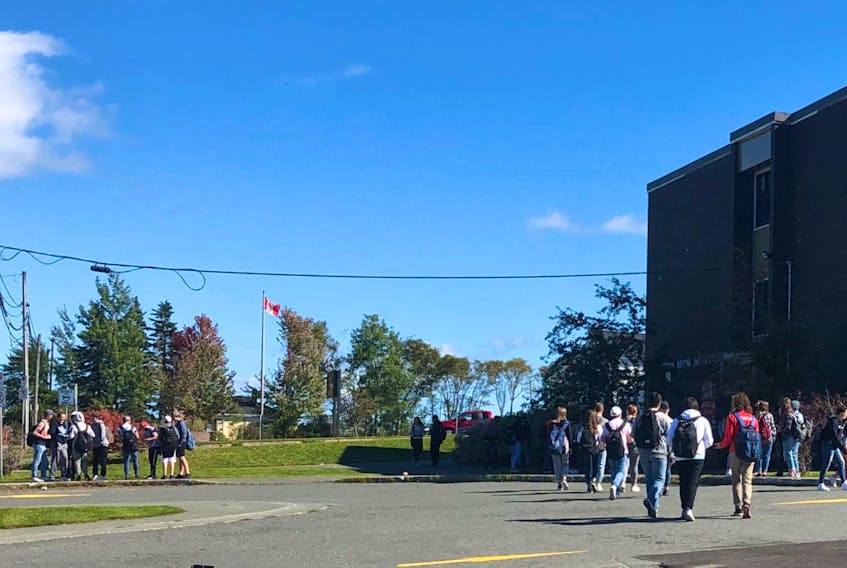SYDNEY, N.S. — Jayden Green said going back to school during the pandemic is nothing like what he thought it would be under Nova Scotia's public health directives.
A Grade 12 student at Glace Bay High School, Green believes COVID-19 would spread quickly through the school if one person had it because there's little social distancing.
"The worst part is the hallways. We're shoulder to shoulder, back to back ... everybody is on top of each other, walking one way," said the 17-year-old.
"Now it feels more crowded. Before you might pass someone on the stairs. Now, we're all trying to go the same way and get out the same exits."
Out of his four classes, Green can remove his mask for one of them and says his classes are the same size as before the pandemic, roughly 25 students.
As per health guidelines, fans can't be used, but windows can be opened, which Green said are sometimes at his school. He said the masks get hot, especially when writing tests and there's more stress on the student. Because of this, some students aren't wearing them in the hallways and Green doesn't blame them.
"I don't know who exactly made the decisions (on these health measures at schools) if it was the centre for education or the premier, but they're not good," said Green, who also wondered if schools would still do lock-down drills which require everyone to hide in a classroom out of sight of windows and doors.
Green places no fault on the teachers and administration, whom he says are just doing what they're being told to. In fact, it's them he worries about contracting the virus more than the students.
"If one person going to Glace Bay High School gets COVID-19, it's going to go through the school ... Glace Bay High has a lot of older teachers," Green said.
"It's not so much about us, the students, as it is about them. Their odds are slimmer ... they'd recover from it."
"Now it feels more crowded. Before you might pass someone on the stairs. Now, we're all trying to go the same way and get out the same exits." — Jayden Green, Grade 12, Glace Bay High School
Cape Breton Regional-Victoria Centre for Education spokesperson Michelle MacLeod told the Cape Breton Post in a written statement they expect all schools are following the province's back-to-school plan, which has guidelines from public health.
"This includes public health's guidance on wearing face masks. We are encouraging students to remain physically distanced while outside and to wear masks when distance can't be maintained," she said.
"Mask use is not required when students are engaged in physical activity. And masks are not required when students are outside with their individual class or cohort. Teachers are encouraging students to take outdoor mask breaks during the day."

Vanessa Walker, a mother of two and a sexual health educator, is concerned youth health clinics aren't open.
Operated by the Nova Scotia Health Authority (NSHA), these clinics are open to anyone age 20 and under and along with checkups, provide at no cost things like morning-after pills, birth control pills and condoms. They also provide testing for pregnancy and sexually transmitted infections, as well as health checks.
"As a parent, I think that the health centre should be open during a pandemic more than ever. It doesn't make sense to me that this resource isn't there for students," she said.
"A lot of people don't have family doctors around here and 811 is flooded with phone calls ... I just feel like having the centre would make sense."
Because of her profession, Walker knows many youth go to health centres for contraception and for health concerns they're not comfortable speaking to their parents or guardians about.
"(If a student needs the morning after pill) that's $40. Where is a high school student going to get $40?" she said.
NSHA spokesperson Lesley Mulcahy told the Post in a written statement that public health is "committed to the successful re-opening of schools" and "has made staffing decisions in the context of the COVID-19 reality with the overall goal of supporting the health of children and youth, as well as educators, to be successful."
"A new temporary team has been established to support schools and the education system to be successful in re-opening. There are two major domains of support for school re-opening — COVID liaison support and Health Promoting Schools (HPS) support," Mulcahy said. "The COVID liaison support involves the establishment of a provincial process and a contact person to act as a support, liaison and connect between education and our COVID outbreak response team. The health promoting school group will support RCE/CSAP partnership infrastructure and collective action."
Mulcahy confirmed some public health programs in the schools have been put on hold until January 2120. These are:
• Youth health centres
• Fluoride delivery
• Enhanced vision screening and pre-primary registration
"Public health nurses and staff normally assigned to this work in schools have been and must remain re-deployed to support COVID-19 monitoring, response and supporting the new COVID liaison team," she said. "Public health realizes the importance of these programs in the longer term and our goal is to return staff to these areas as soon as possible depending on the duration of the pandemic."
The NSHA also provided information about mental health services still being offered to youth, both in person and virtually.
Online services can be accessed at www.MHAhelpNS.ca and www.iwk.nshealth.ca/mental-health. The Kids' Help Phone can be reached 24 hours a day seven days a week by calling 1-800-668-6868 or texting CONNECT to 686868.









